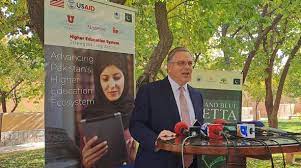Ambassador Donald Blome highlights broad partnership with people of Balochistan

Islamabad: US Ambassador Donald Blome visited Quetta, Balochistan, on November 23 to meet with Chief Minister Abdul Quddus Bizenjo, local partners working to advance climate change adaptation, representatives of higher education institutions, leaders of local NGOs, and Afghan refugees.
During his visit, Ambassador Blome discussed U.S. efforts to combat the effects of climate change through a Green Alliance with diverse partners in Pakistan and underscored the strong cooperation between the United States and Pakistan on promoting economic development through higher education and women’s empowerment.
Ambassador Blome participated in a community tree planting drive that will become part of a larger project to develop an urban forest in the city of Quetta. The project, led by youth activists, aims to advance climate change adaptation, raise climate risk awareness, and increase community resilience to climate change by providing a platform to bring diverse groups together for collective societal benefit.
At the event, the ambassador highlighted that the U.S. government has provided more than 97 million dollars in flood-related assistance to Pakistan this year, including to individuals and communities in need in Balochistan. “But we know that the effects of the flooding are far from over, and every nation faces the threat of climate change. So, we’re working with diverse partners to increase Pakistan’s resilience to climate change through a Green Alliance,” he said.
During the trip, Ambassador Blome also met with leadership from the Balochistan University of Information Technology, Engineering and Management Sciences and the Sardar Bahadur Khan Women’s University to discuss how U.S. government support has helped them respond to local economic development needs in their academic programs. The United States, through the U.S. Agency for International Development (USAID), has provided scholarships to almost 300 students—56 percent of them women—to pursue higher education at the institutions and further their communities’ economic development.

In remarks at the launch event of “Entrepowered—Women Can Do,” a program that will provide $350,000 of seed funding to women entrepreneurs in Balochistan, Ambassador Blome said, “The United States believes that empowering women is a strategic investment in the future for both private citizens and the global economy. By working together on projects like Entrepowered, we can advance women’s equality in the business sector and unleash a vast potential that will help bring prosperity to Quetta and Balochistan.”
The United States is also proud to support the United Nations High Commissioner for Refugees’ (UNHCR) livelihoods program in Quetta, which fosters economic development for Afghan refugees and local artisans. Since 2009, UNHCR, with U.S. funding, has implemented 251 projects in Balochistan to provide infrastructure upgrades to schools, water and sanitation improvements, and health facility upgrades for both Afghan refugees and Pakistani host communities.
Ambassador Blome also visited the Command and Staff College in Quetta and met with Commandant Major General Amer Ahsan Nawaz, XII Corps Commander Lieutenant General Asif Ghafoor and mid-career army officers to discuss the long history of U.S.-Pakistan relations in diverse areas and to emphasize opportunities to work together today, including to build a Green Alliance to support Pakistan’s transition to cleaner and sustainable forms of energy, and to advance our shared interests in trade, investment, health security, climate change, inclusive governance and regional security.
The United States has a broad, deep, and long-term partnership with the people of Balochistan Province spanning the education, economic, health, and rule of law sectors and beyond. We look forward to continuing to deepen and expand these relationships over the coming years. Together we can promote a more stable, secure, and prosperous future for both our nations.





